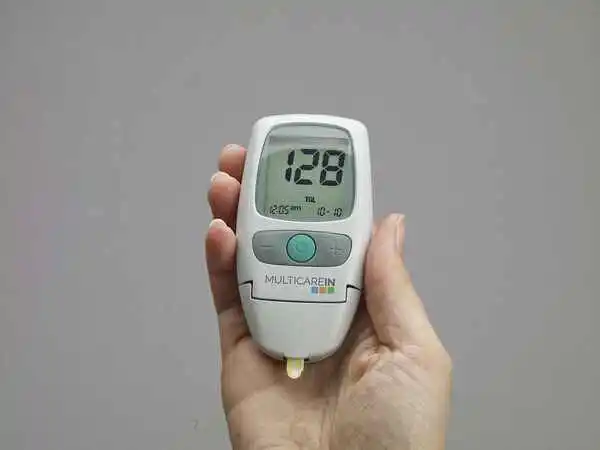High blood sugar, or hyperglycemia, is a condition that affects individuals with diabetes. Various factors can contribute to hyperglycemia, including diet, physical activity, illness, and non-diabetes medications. Missing doses or not taking enough insulin or other blood sugar-lowering medications can also lead to high blood sugar levels12.
Hyperglycemia is a significant concern for both type 1 and type 2 diabetes patients. There are two primary types:
- Fasting hyperglycemia: This occurs when blood sugar levels exceed 130 mg/dL after not eating or drinking for at least 8 hours. Fasting blood glucose levels between 100 mg/dL and 125 mg/dL indicate prediabetes1.
- Postprandial (after-meal) hyperglycemia: This is when blood sugar levels are higher than 180 mg/dL two hours after eating. People without diabetes typically have blood sugar levels below 140 mg/dL after a meal, unless the meal is exceptionally large1.
Consistently high glucose levels can damage nerves, blood vessels, and organs, leading to other serious health issues2.
Blood sugar levels may rise in diabetes patients due to:
- Missing or forgetting insulin or oral glucose-lowering medications
- Consuming more carbohydrates than the insulin dose can handle
- Infections or illness
- Stress
- Reduced physical activity
- Strenuous physical activity when blood sugar levels are high and insulin levels are low12

Insulin resistance is a major cause of hyperglycemia and the leading cause of type 2 diabetes. It occurs when muscle, fat, and liver cells do not respond properly to insulin, requiring higher amounts of insulin to manage blood sugar levels. Without adequate insulin, hyperglycemia can result2.
Here are some reasons why you might develop insulin resistance:
- Obesity: Especially carrying extra weight around your belly and organs.
- Lack of exercise: Physical inactivity can contribute significantly.
- Diet: Consuming highly processed, high-carbohydrate foods and saturated fats.
- Medications: Certain drugs like corticosteroids, some blood pressure medications, HIV treatments, and mental health medications.
- The dawn phenomenon: This is when your blood sugar rises in the morning, typically between 4 and 8 a.m. Researchers believe that the release of certain hormones (like growth hormone and cortisol) overnight increases insulin resistance and raises blood sugar levels.
Causes of high blood sugar in the morning include:
- Insufficient insulin the previous night.
- Incorrect dosage of diabetes medication the night before.
- Consuming carbohydrates before bedtime.
Also Read : Top 10 Foods to Lower Your Blood Sugar Naturally
Hyperglycemia Treatment
If you have diabetes and notice early signs of high blood sugar, test your blood sugar and contact your doctor. They may ask for several readings and could recommend the following changes:
- Drink more water: Water helps remove excess sugar from your blood through urine and prevents dehydration.
- Exercise more: Physical activity can help lower your blood sugar. However, under certain conditions, it can raise blood sugar levels. Consult your doctor to determine the right type of exercise for you.
Caution: If you have type 1 diabetes and high blood sugar, check your urine for ketones. Do NOT exercise if you have ketones. For type 2 diabetes, ensure you have no ketones in your urine and are well-hydrated before exercising. Your doctor might give you the OK to exercise with caution if you feel up to it.
- Change your eating habits: You may need to consult a dietitian to adjust the amount and types of foods you eat.
Adjusting Medications: Your doctor might modify the dosage, timing, or type of diabetes medications you take. Always consult them before making any changes.
For those with type 1 diabetes, if your blood sugar exceeds 250 mg/dL, your doctor may recommend testing your urine or blood for ketones.
Early Signs and Symptoms: Recognizing early symptoms of hyperglycemia can help in timely treatment. Look out for:
- Frequent urination
- Increased thirst
- Blurred vision
- Feeling weak or unusually tired
Later Signs and Symptoms: If untreated, hyperglycemia can lead to ketoacidosis, where toxic acids called ketones build up in the blood and urine. Symptoms include:
- Fruity-smelling breath
- Dry mouth
- Abdominal pain
- Nausea and vomiting
- Shortness of breath
- Confusion
- Loss of consciousness
When to See a Doctor: Seek immediate medical help or call 911 if:
- You have ongoing diarrhea or vomiting and can’t keep any food or fluids down.
- Your blood glucose levels remain above 240 mg/dL (13.3 mmol/L) and you have symptoms of ketones in your urine.
1: WebMD 2: Mayo Clinic


